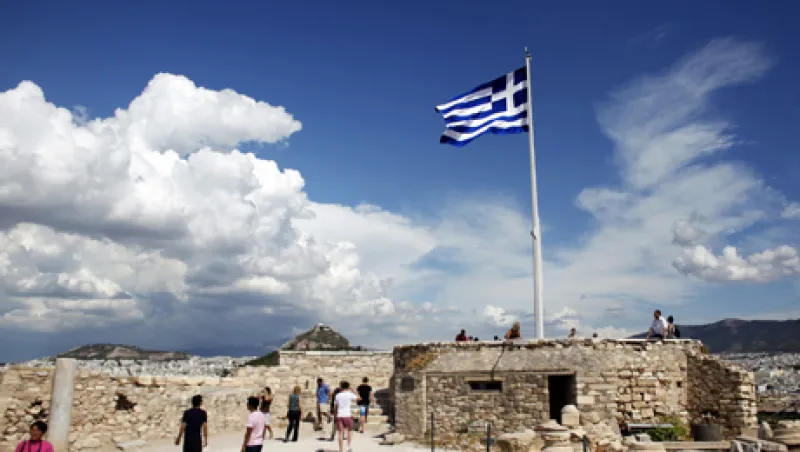In early September, Dimitris Drakopoulos, a European economist based in Nomura Holdings’ London office, returned to his native Greece on a fact-finding trip. Seeking insight into the country’s economic situation, Drakopoulos spent days interviewing political and business leaders. He shared his observations with Institutional Investor contributor Steve Rosenbush, delving into the political, social, cultural and historical forces that have led Greece to the precipice of default.
Institutional Investor: Compared with Ireland and Portugal, Greece has had an exceptionally difficult time keeping up with budget cuts and reforms linked to its bailout. Why is that the case?
Drakopoulos: I can see multiple reasons.
The Greek deficit was larger, the public debt bigger and the economy more imbalanced. Looking ahead, structural bottlenecks to growth are more extreme, although Portugal is close in that front. The size of the fiscal adjustment that Greece is required to make is significantly larger than what was required of Portugal and Ireland. Since May 2010, the total amount of austerity measures required to preserve debt sustainability has been revised several times, mainly due to past fiscal data revisions, worse-than-expected domestic demand and adjustments for lower yield estimates of future measures. The cumulative amount of fiscal measures now stands well above all large fiscal adjustments made in recent economic history.
Politically, Greece is in the unfortunate situation of having a government with a thin majority and an opposition that has chosen a populist approach to the problem. In comparison, in Ireland and Portugal the main parties in power and in opposition have negotiated their adjustment programs with the Troika of IMF and European officials.
There are deep-rooted cultural norms and institutional weaknesses evident within Greek society and politics, probably since the 1980s, which are making implementation more difficult. There is an extensive, weak and disorganized state. Despite endless bureaucracy, the people who have actual executive power are probably underresourced with staff. I don’t have actual data, but I would expect that the prime minister’s office in Greece normally has significantly less staff than the prime minister’s office in Ireland. I wouldn’t look further than the Irish finance ministry. Just check the Irish website and releases over time and compare that with the Greek finance ministry website. Things have improved since May 2010, however. The Greek economy is more rigid and protective of vested interests than that of Ireland. In Greece rent-seeking behavior is sabotaging reform efforts and making it more difficult for Greece to return to sustainable growth.
You have compared the Greek economy to that of the old Soviet Union. What are the similarities?
Well, there are many well-known structural impediments that reduce potential output: the efficiency and effectiveness of the public administration, rigidities in the product and labor markets, a large informal economy which creates a very toxic mix for public finances, all combined with a weak tax administration. Together these elements created a highly uncompetitive and externally indebted economy that at some point faced external financing constraints.
The European Commission-IMF program addresses a very large amount of these structural impediments. The problem, however, is that the effects of these reforms, especially when implemented partially, produce a J-curve recovery. Benefits would appear in the long run, but short-term effects would be negative.
The Soviet Union comparison has to do with the enormous government interference that creates an economy that cannot easily deflate itself back to competitiveness.
What is the outlook for Prime Minister George Papandreou’s Panhellenic Socialist Movement (Pasok) and its rival New Democracy?
The Pasok government is fighting to avoid civil unrest like that of Argentina in December 2001. Its reform drive has surprised to the downside probably since the local elections at the end of last year.
New Democracy has stuck to a very populist rhetoric without recognizing its own mistakes during the Karamanlis administration. Fundamentally, it agrees with the privatization program and most growth-enhancing reforms. However, in the fiscal area ND policies fail to recognize the scale of the fiscal problem and are more targeted toward pleasing voters. They are asking for tax cuts in many areas that won’t achieve much or would in many cases make things worse. I don’t agree with many of the revenue measures of the government, but I don’t think ND tax cuts are the answer. Hoping that lower taxes will incentivize people to consume in this environment is unrealistic. Greek private consumption as a percentage of GDP is well above the EU average, while consumption taxes for many years have been very low. The corporation tax is already low by EU standards. Furthermore, if their fiscal plans were realistic, I am sure all the expenditure cuts they propose would have already been implemented fully by the IMF and EC program. Sadly, the yields of the expenditure cuts they recommend are probably exaggerated to justify the tax cut proposals. Finally, given ND populist behavior during this crisis, its leader has probably lost his negotiating power with many of Greece’s creditors.
Taking into account the political realities and the fragile majority of Pasok, I think the best outcome would be a coalition between Pasok and some of the smaller right-wing parties. At times, these parties have sensible proposals. This would be difficult, but elections in the current environment are a much more dangerous option.
Is there any support within Greece for leaving the euro?
Leaving the euro is definitely not on the table. It is also a political issue. Going to the euro was one of the big political wins for Greece since the end of dictatorship in 1974. Only the Communists might want to leave the euro, and even many of them would not think it is a very good idea.
What is in the cards for the economy of Greece? Can it grow again?
It is very hard to grow and have fiscal adjustments at the same time. To grow, it needs the public sector to be smaller. Exports are the only thing that can grow in this environment. It is going to take time. I don’t think that Greece can stop contracting before the end of next year. It will depend upon what measures are put in place. Greece has a competitive problem that is not going to be solved just by tax collections or restructuring. It needs a smaller state and privatization. There is a lot of real estate that could be used to promote growth. Tourism, believe it or not, is relatively undeveloped compared with other countries in the Mediterranean.
In many ways, Greece resembles the Soviet Union in its economy. Liberalization is happening now. It might make things worse over the short run. But eventually, it will help.






